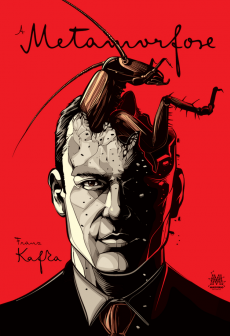
Email: reecejordan98@hotmail.co.uk
Total Article : 168
About Me:18-year-old sixth form student, studying English Literature, History and Government and Politics. My articles will broadly cover topics from the current affairs of politics to reviews of books and albums, as well as adding my own creative pieces, whether it be short fiction or general opinion.

Franz Kafka’s ‘The Metamorphosis’ has been dubbed as the greatest short story ever written. This is not because its subject matter is so avant garde that it is elevated above all else; indeed any story which can be seen to have a ‘deeper meaning’ can never really be deemed superior than any other of the same category on that premise. Those that look at literature through a juvenile needy lens, hoping to be told how to view the world, will find no solace in this story, or indeed any of Kafka’s work. Instead Kafka’s ‘Metamorphosis’ beauty lies in its ambiguity. He merely presents us an image, never steering us too directly to his metallic intention, always offering us ash clouds of suggestion.
The story begins, as the title alludes to, with Gregor Samsa, a travelling salesman, suddenly waking from a fitful dream as a giant insect (some say cockroach, some say bedbug). The darkly comical tone is cultivated from the very start – poor wriggling Gregor worrying about going to work, whilst barely being able to shift his newly alien body. What then proceeds is, as Vladimir Nabokov so correctly termed it, ‘like something out of your worst dream’. The Samsa family each try to wake Gregor, throttled further by the arrival of his office manager, only to find that their beloved son has changed, for no apparent reason, into a huge bug.
This humourous juxtaposition of seemingly uninitiated fantasy and Gregor’s humane nonchalance very soon becomes tinged with poignancy. The very title of the novella invites us to draw our attention to transformation, as it is change that underpins the entire story. The good reader, however, will notice that the smallest change throughout is, ironically, that of the sudden transformation of human being to insect. Instead, what Kafka appears to want us be attentive to is the other transformations, those that, whilst not so stark and immediate as the situation Gregor Samsa finds himself in, should strike us as just as tragic. Namely, the changing attitude of Gregor’s family towards their son and brother, who, as it transpires, supported the entire family with an apartment and a dream send his sister to the best music school around – with a job he hated. As the story progresses, their love for this being regresses into embarrassment, culminating in Herr Samsa throwing an apple with such vindictive intent that it imbeds itself into Gregor’s shell – a poignant image of a creator seeking to destroy his creation. Thus, ‘The Metamorphosis’, by showing this painful decay of familial love, forces us to question what this love is actually dependent on – image, concept or essence? It must be noted as well, that Franz Kafka came from a Jewish family, and would have been attentive to the increasingly dehumanising rhetoric associated with the Jews. You may know that one such topical example would be the attribution of the epithet of ‘cockroaches’ to the Jewish community, and I need not tell you the subsequent effect of such language.
Kafka’s novella is a work of genius that, weaving throughout the very fabric of not only his story, but the prose features that are coupled with it, shows the mutation of essence and our susceptibility to these changes.
Image credits: f--info.com

0 Comment:
Be the first one to comment on this article.